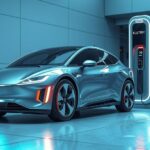Tesla Launches Electric Vehicle Sales in Saudi Arabia Amidst Global Challenges
Tesla will begin selling electric vehicles in Saudi Arabia, amidst falling global sales and increased competition, particularly from BYD in China. Challenges include low local EV adoption rates, declining sales in Europe, and potential buyers’ disinterest linked to Elon Musk’s controversial role in government. Investors are becoming increasingly skeptical, leading to a significant drop in Tesla’s stock value.
Tesla has announced its plan to commence sales of electric vehicles (EVs) in Saudi Arabia, the largest economy in the Gulf region, amidst a decline in global sales. The company will host a launch event on April 10, showcasing its electric vehicles, where attendees can also experience the Cybercab, an autonomous driving model, and meet Optimus, a humanoid robot representative of Tesla’s focus on artificial intelligence and robotics.
Despite the launch, Tesla may face challenges in gaining traction in Saudi Arabia, where EVs only comprise slightly over 1% of all vehicle sales, according to a recent report by PwC. This anticipated entry into the Saudi market coincides with a turbulent period for the company, notably recording its first annual sales drop of 1% since becoming a public entity.
Tesla’s competition has intensified, particularly in China, where BYD, a prominent electric and hybrid vehicle manufacturer, reported $107 billion in sales for 2024, surpassing Tesla’s nearly $98 billion. Additionally, BYD has introduced an ultra-fast charging system that adds 250 miles of range in five minutes, significantly outperforming Tesla’s Supercharger technology, which provides 200 miles in 15 minutes.
The company is also experiencing decreased vehicle sales in Europe, with a decline of approximately 40% in sales reported in February compared to the prior year. Furthermore, in the United States—a key market for Tesla—CEO Elon Musk’s controversial government position has alienated some potential buyers, contributing to the falling value of used Teslas despite a rising interest in pre-owned EVs.
Musk’s actions have led to vandalism against Tesla properties, prompting the FBI to establish a task force to address violence related to the brand. Protests at various Tesla locations have also occurred, reflecting public discontent with Musk’s governmental involvement. Consequently, many investors have opted to divest from the company, resulting in a 40% decrease in Tesla’s stock value since achieving an all-time high in December.
Tesla’s expansion into Saudi Arabia marks a significant move amidst declining global sales and escalating competition. Despite the potential opportunities in the Gulf market, the company confronts numerous challenges, including limited local EV adoption, international competition from companies like BYD, and internal issues stemming from CEO Elon Musk’s political role. Investors have reacted negatively to these developments, further weighing on Tesla’s stock value, which has seen a stark decline since its peak.
Original Source: www.cnn.com








Post Comment